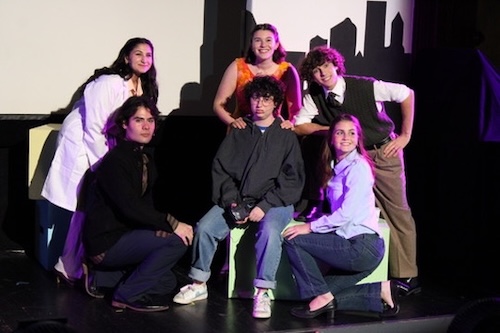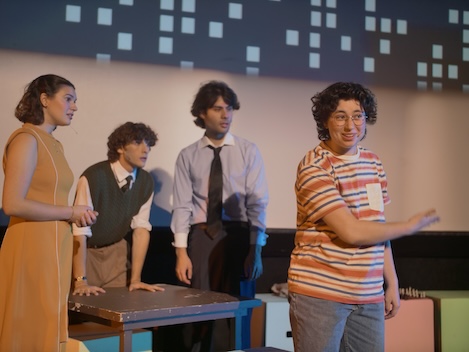
In my sophomore year of high school, I became involved in a complicated queer love triangle that resulted in my then-girlfriend falling in love with her best friend and a reframing of my relationships with both of them. The breakup and its fallout left me with a passion for the musical “Falsettos,” written by William Finn and James Lapine.
I never considered myself a theater kid, but the musical became my Torah. Suddenly, the characters morphed into archetypes that I could apply to the people around me. The complicated relationships and emotions it grappled with made me feel less alone as I navigated my relationship with my ex. The musings about the complicated state of the world felt apt entering a new decade—the 2020s—in the midst of a global pandemic, a Trump presidency, and wildfires ravaging the West Coast. The line, “Could this be the new world we started?” felt all too relatable.
So, you can imagine my excitement when I heard that Spike Tape was putting on a production of “Falsettos,” directed by Quincy Segal ’26. Much to the chagrin of my roommates, I’ve been singing “Falsettos” lyrics nonstop ever since the production was announced—you’d be surprised at how often the lyric “four Jews in a room bitching” applies to the situation at hand.
But I was also nervous about the production. The music is daunting, constantly changing time signatures and keys, and the production is entirely sung-through over its two-hour-and-thirty-minute runtime. Characters often sing over each other, and certain lines are sung so quickly that the actors barely have time to breathe. Additionally, the cast is physically and metaphorically rebuilding their world over the course of the show, rearranging the large multicolored blocks that construct the set. The production would require a fantastic band and cast, totally synchronized and committed, to deliver on the show’s demands.
I am happy to report that the production, which was performed on Friday, Nov. 22, Saturday, Nov. 23, and Sunday, Nov. 24 in the Ring Family Hall, exceeded all of my expectations. The brilliant seven-person cast and the four-person pit delivered on all fronts, producing an exhilarating and touching work of art.
Falsettos revolves around a middle-aged businessman named Marvin (Oscar Hershkowitz ’28), who leaves his wife, Trina (Saydie Grossman ’26) and his son, Jason (Jordan Schwarz ’26), to be with his gay lover, Whizzer (Conrad Lewis ’26), and struggles to keep his tight-knit family together. Meanwhile, his psychiatrist, Mendel (Harry Resnik ’28), falls in love with Trina and begins parenting Jason. Sound complicated yet? After the two-year time jump, which places us in 1981, the lesbians from next door, Cordelia (Izzy Auerswald ’27) and Dr. Charlotte (Aryia Banihashem-Ahmad ’28), enter the mix as Jason prepares for his Bar Mitzvah and Whizzer becomes afflicted with AIDS.
The show fleshes out each character and their relationships with one another rather than relying on a series of causes and effects to drive the plot forward. Music director Ale Philippides ’27 explained how the musical has remained relevant to a modern audience.
“There are tons of timeless themes related to family that our Wesleyan audience can get out of it, in addition to what it means to be queer and Jewish,” Philippides said. “It tells a timeless story of how this unorthodox family came together and how they fought and loved each other and how they re-understood their roles in the family.”
To properly portray a story which is essentially a period piece of the late ’70s and early ’80s, the cast and crew went through extensive workshopping with the show’s dramaturg, Nick Jacobs ’27.
“We learned about the AIDS epidemic, the gay community in New York during the ’70s and ’80s, and Judaism—Jewish baseball players, Bar Mitzvahs, even what is gefilte fish,” Segal said.
What stood out in this production of “Falsettos” was the way that each actor brought their character to life with untempered energy and emotion, as well as the unique quirks that differentiated the characters from their iconic 2016 Broadway revival renditions. The actors threw themselves into the production entirely, singing their hearts out onstage and giving each beat the proper degree of emotional umph.
Hershkowitz anchors the show in the role of Marvin, a businessman living on the Upper West Side who struggles to balance parenting his son and his relationship with his lover, with whom he is constantly fighting. The tension running through the family comes to a head in the Act I song “Marvin Hits Trina,” which Segal described as the most difficult scene to direct due to its sensitive subject matter of domestic violence. The scene felt appropriately heavy without being over-exaggerated, and much of this was due to Hershkowitz’s depiction of Marvin. The tension in the scene was also exacerbated by the blocking and stage design, which depicted each family member as physically segregated in different parts of the stage.
In Act I, Marvin is a complete asshole in his relationships with his wife, psychiatrist, and lover—so it is a testament to Hershkowitz’s reserved portrayal that the audience was still invested in Marvin and Whizzer’s relationship in Act II, when Marvin’s emotional journey takes center stage. Hershkowitz’s mellow voice was highlighted in “What More Can I Say?,” a tender post-coital song in which Marvin announces that he’s been revived, and “What Would I Do?,” a heart-wrenching duet between Marvin and Whizzer in which the men’s voices blended beautifully.
Throughout the production, I found myself wishing that Marvin was a more concrete character. I have a hunch that this is more related to the content of the show itself than Herskowitz’s portrayal—Marvin’s confusion in love is reflected in his confused characterization. However, I thought the production could have drawn out his personality more, perhaps lending him more chutzpah.
Lewis brought a magnetic energy to Whizzer, channeling sass and charisma. His physical performance, which expertly portrayed the character’s descent into illness, stood out in the two racquetball games that pit Marvin and Whizzer against each other in Act II. In the first game, Lewis’ coyness made the competition appropriately steamy, while in the second, his debilitation was believably acted, culminating in a dramatic fall. His two solo songs, “The Games I Play” and “You Gotta Die Sometime,” highlighted his powerful, sometimes smarmy voice, well-suited for the character of Whizzer.
A standout performance in the show was Grossman in the role of Trina. Her exasperated portrayal of being on the verge of a mental breakdown in the comedic song “I’m Breaking Down” was impeccable and drew bouts of well-deserved laughter from the audience. But she really excelled in “Trina’s Song” and “Trina’s Song (reprise),” in which she pours out her frustration with the men in her life, singing, “I’m tired of all the happy men who rule the world.”
Her crystal-clear voice also soared in Act II’s emotional song “Holding to the Ground,” which expressed Trina’s struggle to remain sane in a world in which the ground keeps shifting. I felt privileged to see her powerhouse performance entirely commanding the stage and audience during Sunday’s closing performance. I also loved the chemistry between Grossman and Resnik, emphasizing the sweetness in Trina and Mendel’s messy relationship.
Resnik’s portrayal of the incompetent psychiatrist Mendel was one of the comedic highlights of the show. He brought a sweet goofiness to the character in his acting, with his awkward dancing and his infatuation with Trina that splayed him out on the floor while “praising [her] thigh.” Resnik’s comedic prowess was on display in the song “Everybody Hates His Parents,” in which Mendel gives fatherly advice to Jason, singing the hilariously dramatized lyric, “God said to Moses:/‘Moses, everyone hates his parents/That’s how it is!’/And God knew/Because God hated His.”

Another highlight of Resnik’s performance was his ability to feed off of the energy in the audience. There were a few times during his performances where he directly addressed the audience by pointedly exclaiming “Homosexuals!” or blowing kisses. It added charisma to his already charming character and exemplified Resnik’s comfort onstage. The relationship between Mendel and Jason was especially tender in this production due to the chemistry between Resnik and Schwarz.
Schwarz was perfectly cast for the role of Jason, the troubled son of Marvin and Trina. Schwarz’s performance in the song “Miracle of Judaism,” in which Jason laments that he “[doesn’t] want the girls [he] should want” was an impressive embodiment of a boy on the brink of teenagehood. Schwarz brought a charming awkwardness to the character that seemed appropriate for the age range. Their adolescent recitation of Hebrew during Jason’s Bar Mitzvah was poignant and expressed the same cringeworthy sincerity of a real Bar Mitzvah.
The lesbians next door absolutely filled out the sound of the show in the second act. Auerswald’s portrayal of Cordelia, the shiksa caterer, was spot-on as a sweet, well-meaning partner to Dr. Charlotte. I loved how her inability to pronounce gefilte fish and her recurring failure to produce edible hors d’oeuvres was played up for comedic effect.
The pair’s voices blended in stunning harmony in the touching song “Unlikely Lovers,” in which Marvin, Whizzer, Cordelia, and Dr. Charlotte express their love for one another in pitch-perfect four-part harmony. The chemistry between all four actors made the love believable as they sang, “Let’s be scared together / Let’s pretend that nothing is awful,” staking out their relationships in the face of uncertainty and death. The cast did a fantastic job of blending their voices and syncing up during this song and others in Act II.
“Falsettos is full of these really rich harmonies that are fun in rehearsal to break down and see come together,” Philippides said. “To sing harmony, you have to not just sing, but listen to those around you to blend with them and match their energy, vowel placement, and emotion.”
Banihashem-Ahmad was another standout performance in the show. Her soulful voice shook the theater and brought gravity to the song “Something Bad Is Happening,” in which Dr. Charlotte expresses trepidation about AIDS—which is never named in the show, only described as “Something that kills/Something infectious/Something that spreads from one man to another.” The confusion and fear characterizing the gay community in the early ’80s was expressed clearly through Banihashem-Ahmad’s commanding performance, which stole the stage in Act II.
The four-person pit—directed by the inimitable Gavin Cui ’26 (who should seriously consider a career as an umpire after his passionate screaming during “The Baseball Game”) and including Charles Pasca ’28 on drums, Marissa Clauburg ’25 on reed, Elyot Segger ’28 on synth, and Adam Kleber ’28 as a pit assistant—deserves special praise for its masterful handling of Finn’s intricate score. The musicians provided a stable backdrop for the vocal performances that never overpowered them and moved through the show’s relentless time and key changes with a grace that made it seem easy.
Segal, who pitched the show twice before it was selected by Spike Tape’s show selection committee, expressed that his hope for the show was that everyone would be tearing up by the end of it. I know I’m not only speaking for myself when I say that his goal was fulfilled. Over the runtime of two-and-a-half hours, I was reminded of why I fell in love with “Falsettos” originally as a neurotic teenager and why it’s still my favorite musical as a neurotic adult.
Decades have passed since the show’s subject matter, and yet the world is still broken. We are often cajoled into isolation and numbness when facing the horrors that pervade our modern world; seeing one unorthodox family grapple with suffering onstage gives us a chance to reconnect with those negative emotions. But the devastating finale of “Falsettos” isn’t all it has to offer—it contains an entire kaleidoscope of joy, laughter, horniness, insanity, neuroticism, and love that makes the show as sweet as nouvelle Bar Mitzvah cuisine.
Hannah Langer can be reached at hlanger@wesleyan.edu.



Leave a Reply